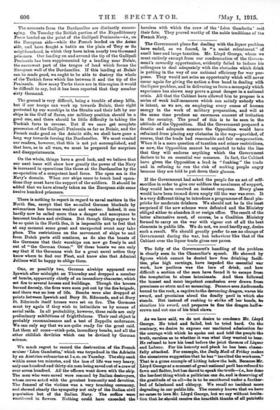The Government plans for dealing with the liquor problem have
ended, as we feared, in "a moist relentment" of small beer and large taxation. Mr. Lloyd George, whom we must entirely exempt from our condemnation of the Govern- ment's cowardly opportunism, evidently failed to induce his colleagues to deal adequately with the obstacles which drink is putting in the way of our national efficiency for war pur- poses. They would not seize an opportunity which will never occur again for giving the nation a free band in dealing with the liquor problem, and in delivering us from a monopoly which experience has shown may prove a great danger in a national crisis. All that the Cabinet have allowed him to propose is a series of weak half-measures which can satisfy nobody who is intent, as we are, on employing every ounce of human energy in the work of military preparation, and will at the same time produce an enormous amount of irritation in the country. The proof of this is to be seen in the attitude of the Opposition. Had the Government proposed a drastic and adequate measure the Opposition would have refrained from placing any obstacles in the way—provided, of course, that the trade had reasonable and fair compensation. When it is a mere question of taxation and minor restrictions, as now, the Opposition cannot be expected to take the line that they will endorse anything which the Government declare to be an essential war measure. In fact, the Cabinet have given the Opposition a lead in " f arcking " the trade and in refusing to run the risk of making people angry because they are told to put down their glasses.


































 Previous page
Previous page